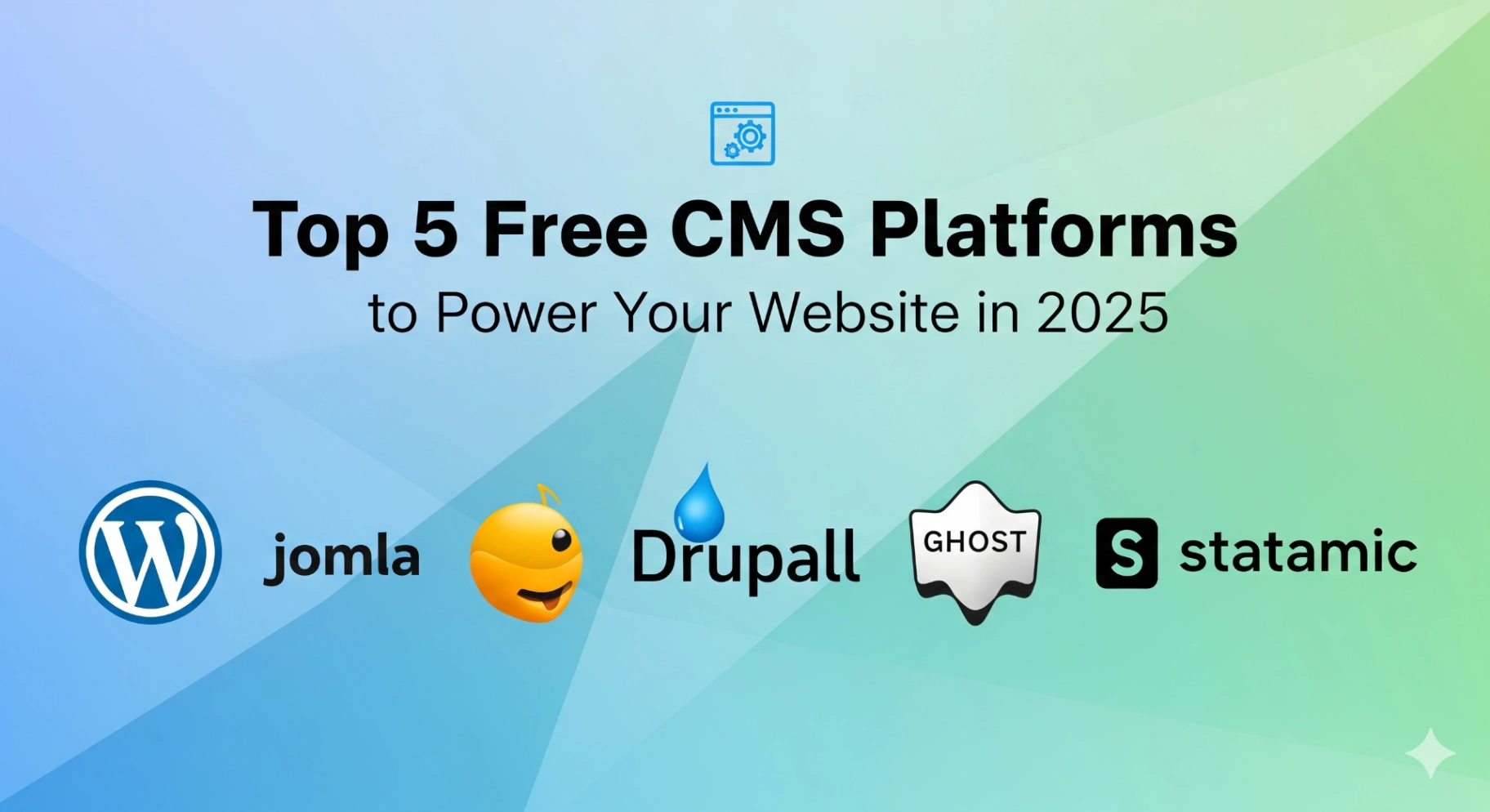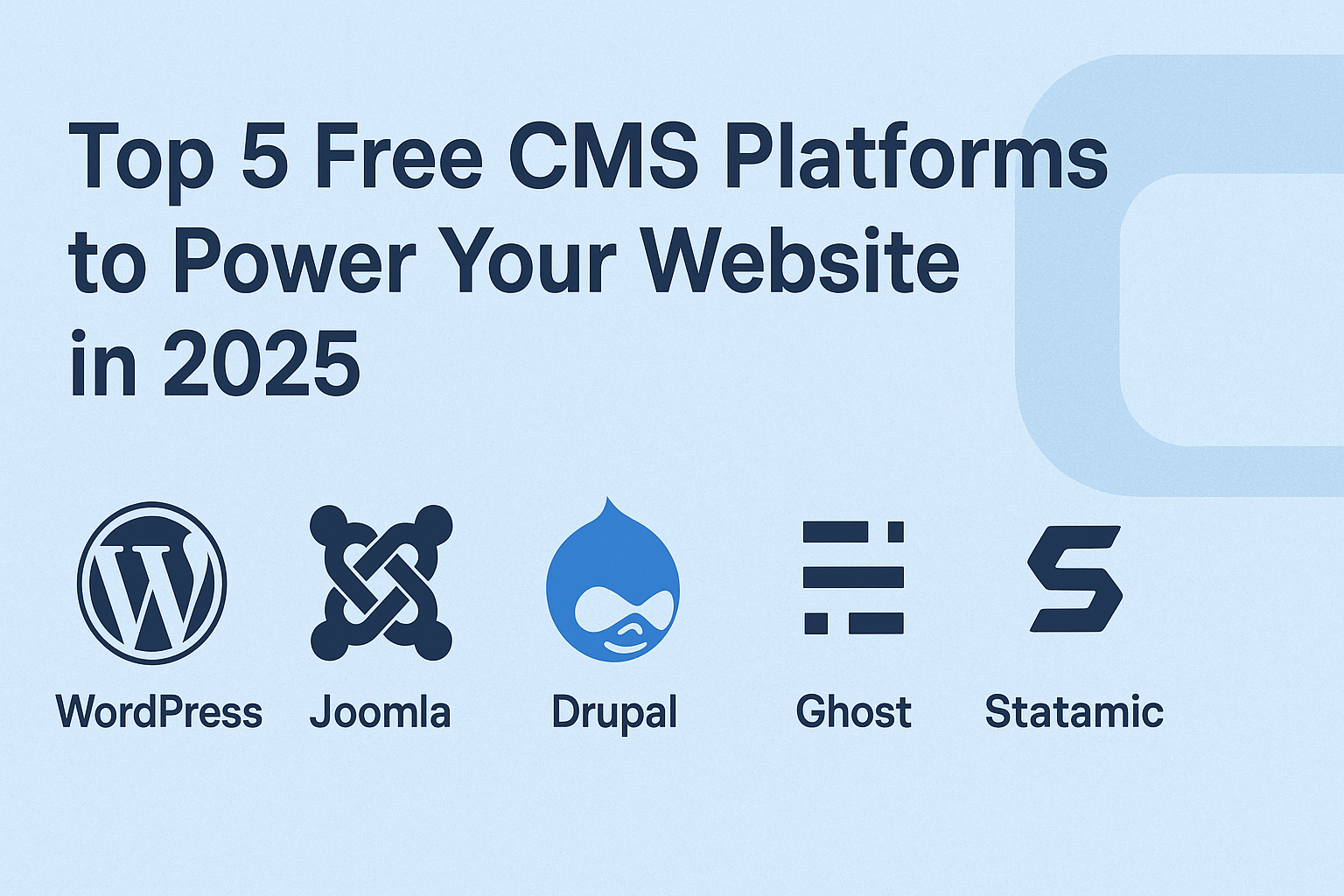
Top 5 Free CMS Platforms to Power Your Website in 2025
Navigating the digital landscape in 2025 demands a powerful yet budget-friendly CMS. Discover the top 5 free content management systems that empower you to build stunning websites and manage your content effortlessly, without breaking the bank.
Top 5 Free CMS Platforms in 2025: Powering Your Online Presence
Choosing the right Content Management System (CMS) is crucial for building a successful website. A robust CMS empowers you to create, manage, and modify your online content without requiring extensive coding knowledge. With so many options available, selecting the perfect fit can be daunting. This post explores the top 5 free and open-source CMS platforms predicted to dominate in 2025, providing insights, examples, and actionable tips to help you make an informed decision.
1. WordPress: The Undisputed King
WordPress continues its reign as the most popular CMS, powering over 40% of the web. Its versatility, extensive plugin ecosystem, and massive community make it a top choice for beginners and seasoned developers alike.
Key Features:
- Ease of Use: Intuitive interface for creating and managing content, even without coding experience.
- Flexibility: Suitable for various website types, from blogs and portfolios to e-commerce stores and complex web applications.
- Extensive Plugins & Themes: Thousands of free and premium plugins and themes extend functionality and customize appearance.
- Large Community: A vibrant community provides ample support, resources, and tutorials.
Practical Example: A small business owner can easily set up an online store using WooCommerce, a popular WordPress plugin, without needing to hire a developer.
Actionable Tip: Leverage WordPress's Gutenberg editor for a modern content creation experience, utilizing blocks for dynamic layouts and multimedia integration.

2. Joomla: The Versatile Powerhouse
Joomla is a powerful and flexible CMS known for its robust features and multilingual capabilities. It's ideal for building complex websites and web applications.
Key Features:
- Advanced User Management: Granular control over user permissions and access levels.
- Multilingual Support: Built-in support for multiple languages, making it ideal for global audiences.
- Strong Security Features: Regular updates and security patches ensure website safety.
- Flexible Templates & Extensions: Customize website appearance and functionality with various templates and extensions.
Practical Example: A non-profit organization can use Joomla to manage multiple user groups (volunteers, donors, staff) with different access levels.
Actionable Tip: Explore Joomla's Access Control List (ACL) to fine-tune user permissions and enhance website security.
3. Drupal: The Developer's Choice
Drupal is a highly scalable and customizable CMS favored by developers for building complex and high-traffic websites. Its robust architecture and API-first approach make it a powerful platform for enterprise-level projects.
Key Features:
- High Scalability: Handles large amounts of traffic and content efficiently.
- Advanced Content Modeling: Create custom content types and fields to tailor your website to specific needs.
- Strong Security: Emphasis on security best practices and regular updates.
- API-First Approach: Facilitates integration with other systems and applications.
Practical Example: A large university can utilize Drupal to build a robust website with different sections for departments, research, and student resources.
Actionable Tip: Leverage Drupal's Views module to create dynamic displays of content, filtering and sorting information based on specific criteria.
4. Ghost: The Minimalist Blogging Platform
Ghost is a modern and minimalist CMS specifically designed for bloggers and publishers. Its focus on simplicity and content creation makes it an excellent choice for those seeking a streamlined blogging experience.
Key Features:
- Clean and Intuitive Interface: A distraction-free writing environment for focused content creation.
- Built-in SEO Features: Optimized for search engine visibility and content discovery.
- Fast Performance: Lightweight and optimized for speed, ensuring a smooth user experience.
- Subscription Management: Built-in support for memberships and paid subscriptions.
Practical Example: A freelance writer can use Ghost to build a personal blog and offer premium content through paid subscriptions.
Actionable Tip: Utilize Ghost's built-in SEO features like meta descriptions and structured data to improve your blog's search engine ranking.
5. Statamic: The Flat-File Powerhouse
Statamic, though not entirely free (it has a paid Pro version), offers a generous free version ideal for smaller projects. It's a flat-file CMS, meaning content is stored as files, offering speed, flexibility, and easier version control.
Key Features:
- Flat-File Architecture: Enhanced speed, security, and portability compared to traditional database-driven CMSs.
- Flexible Content Modeling: Create custom content structures tailored to your needs.
- Git Integration: Seamless version control and collaboration using Git repositories.
- Developer-Friendly: Offers a robust API and templating engine for customization.
Practical Example: A web developer can use Statamic to build a portfolio website with custom content types for showcasing projects and skills.
Actionable Tip: Explore Statamic's Antlers templating language for greater control over the presentation of your website's content.
Conclusion: Choosing Your Ideal CMS
Choosing the right CMS depends on your specific needs, technical skills, and project scope. WordPress remains the go-to choice for its ease of use and vast ecosystem. Joomla offers powerful features for complex websites, while Drupal is ideal for large-scale projects and developers. Ghost caters to bloggers seeking a streamlined experience, and Statamic offers a flat-file alternative for enhanced speed and flexibility. Carefully consider your requirements and explore the features of each platform to make the best decision for your online presence in 2025 and beyond.